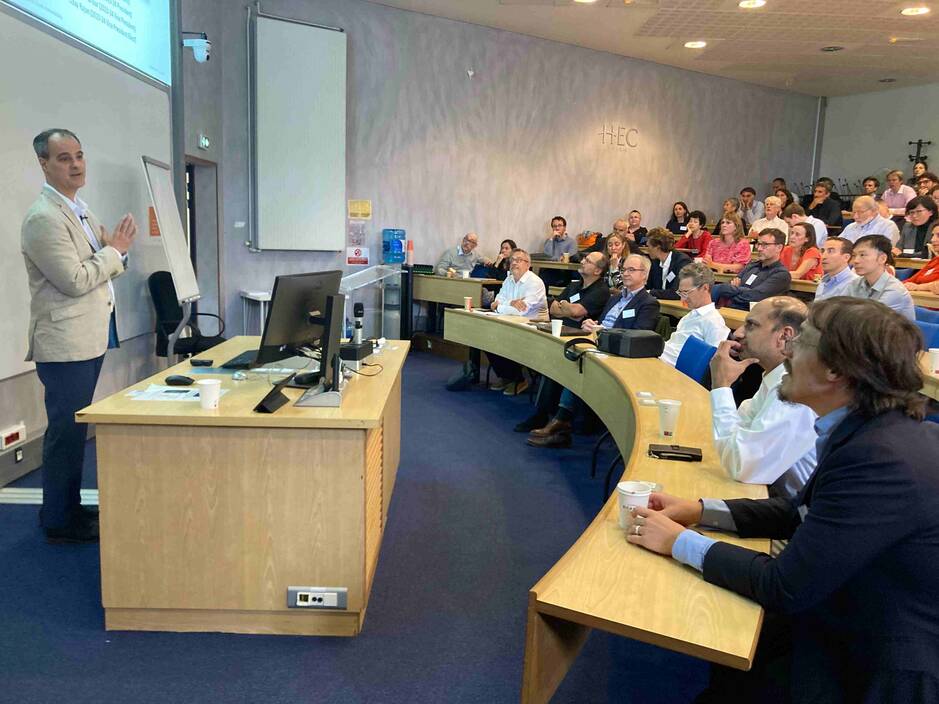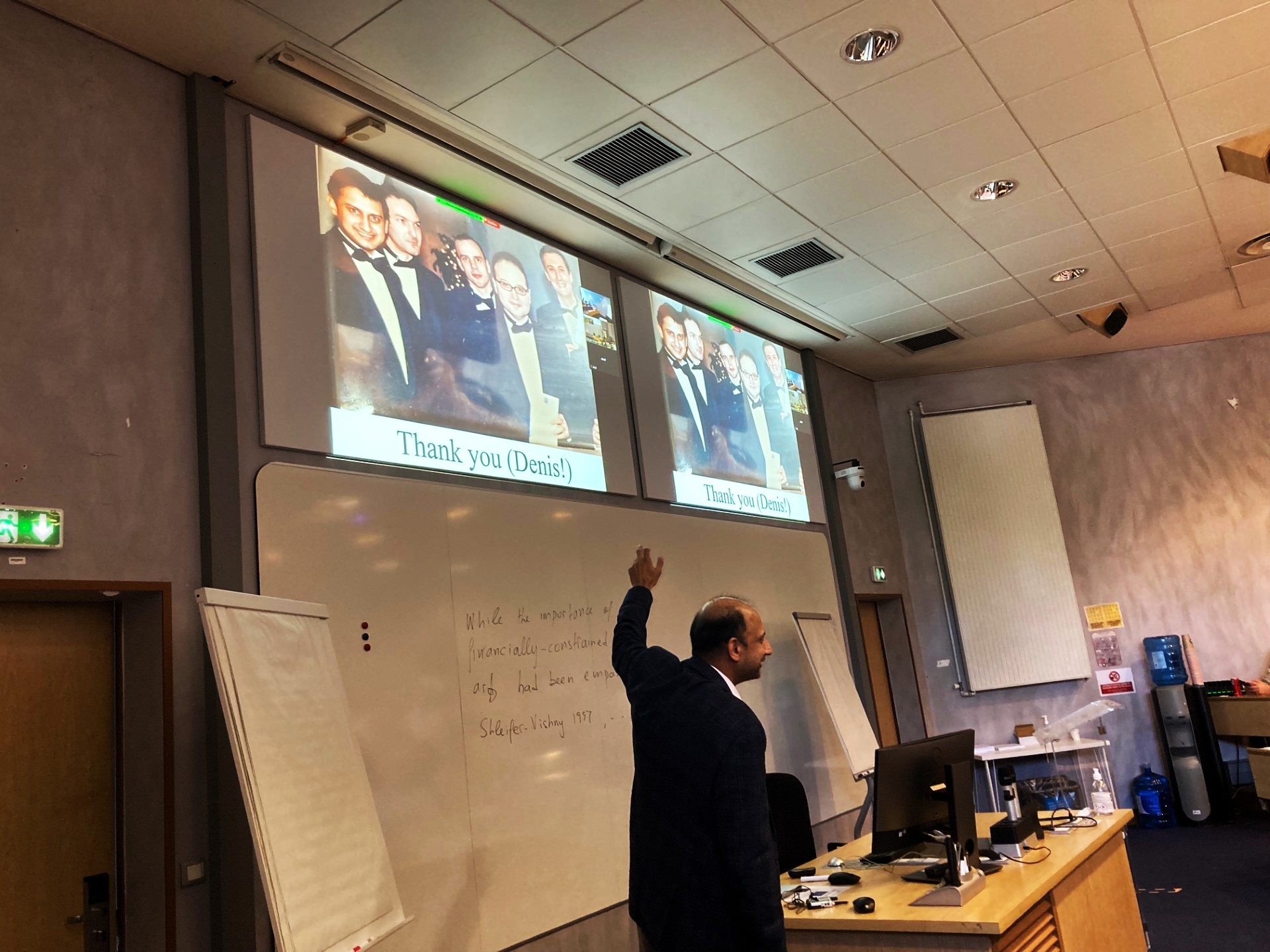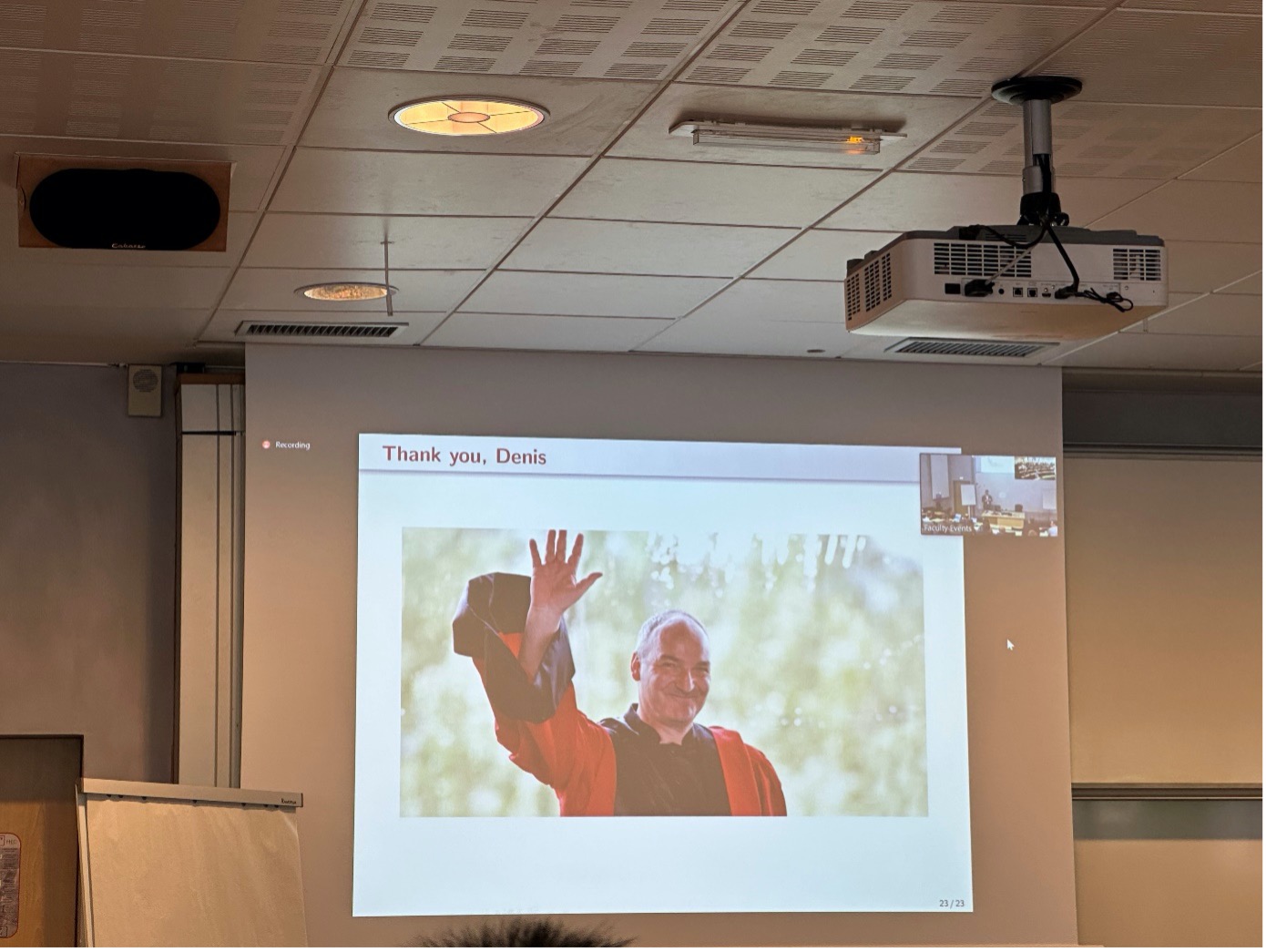ERC Summer School/PhD Workshop. Part One: Powerful Homage to Denis Gromb
The seventh PhD Workshop in Finance united academics from around the world around the spirit and works of Denis Gromb. The late Professor of Finance at HEC Paris initiated this Workshop in 2010, providing a platform for doctoral students in the final year to present their early-stage research to each other and to seasoned academics. The 2023 event inaugurated an award in Gromb’s name. Its workshop centered on the theme of incentives in finance.

Professor Dimitri Vayanos, first speaker in day of homage to Denis Gromb ©Daniel Brown
This four-day ERC Summer School/PhD workshop kickstarted HEC’s academic year in spectacular fashion. Almost 200 top academics, students and staff members shared an on-campus event with a global reach. It was supported by the European Research Council (ERC) grant on “Welfare, Incentives, Dynamics and Equilibrium”. As testified by the numerous homages throughout the August 30-September 2 gathering, during his 30-year career Denis Gromb generously shared his knowledge, advice and humor with the global finance community. “Denis’ trajectory reminds me of the adage: ‘Life should be great rather than long,’” said the Viral Acharya, professor at NYU and former Deputy Governor of the Reserve Bank of India, during the opening session of the Denis Gromb Memorial Day.

Professor Viral Acharya paying homage to a young Denis Gromb, second from left. © Daniel Brown
The quote from the Indian philosopher Babashaheb reflected Gromb’s intense academic life which centered on his tenure at the Sloan School of Management, LBS, INSEAD and, finally, HEC Paris. Many of those attending the workshop had long relationships with the specialist in corporate finance and governance. “His theoretical approach influenced me in every single way,” said Giorgia Piacentino who met Gromb at the beginning of her PhD trek at LSE in 2009. “The first time our paths crossed, he spent over an hour with me. And that was the kind of glimpse of his generosity which became legendary.” The finance researcher, now a professor at USC, underlined Gromb’s impact on her approach: “His models kept to the essence, taking away all non-essentials, stripping them down to the bare bones.” Gromb and Piacentino were joined by another student, Jason Donaldson, now also at USC, a year later. This trio went on to publish groundbreaking work on the “paradox of pledgeability” through models in which collateral serves to protect creditors. The exploration continues to this day, as Donaldson and Piacentino told the audience: a posthumous article, “Collateral Reallocation” is in the pipeline: “Giorgia and I are working tirelessly to publish it soon, but I have to admit it’s very hard to do - factually and emotionally,” admitted Donaldson. “Yes, we’re having to second guess each word, each decision, wondering if he would have done it this way or that. We need to maintain Denis’ rigor, spirit and approach to applied theory,” added Piacentino.
For Patrick Bolton, Denis Gromb incarnated a unique ability to keep models down to their essence, stripping away all that was non-essential, “reaching the bare bones” whereby he could shed light on a puzzling fact in a model: “He was really an artist in that respect: pruning down the model to just what you needed, distilling the essence of an idea. He was working on material that was in the Nobel prize community, the equal to Jean Tirole, Eric Maskin, Oliver Hart and so on,” confided the professor of finance from Imperial College London.
Gromb’s complicity with Stern School of Business’s Viral Acharya dated back to the early 2000s. “Denis was a very clean and elegant thinker,” he said after his presentation. “He had a beautiful way of converting economic insights into models which were transparent and made a very sharp and focused point. Denis had a way of scything through the bushes and reaching the core of the idea.” Acharya pinpointed Gromb’s work, respectively with Dimitri Vayanos, and with Mike Burkart /Fausto Panunzi: “Together, they contributed outstanding insights into financially constrained arbitrage, ownership and governance. But,” Acharya concluded, “Denis Gromb was best known for his work with PhD students like we see gathered here today.”
A Tree with Long Roots
This recognition and the determination of the organizers to perpetuate Gromb’s work with doctoral students was palpable throughout the day dedicated to his memory. It ended with the planting of a tree next to the conference building in front of his wife and daughter. “Denis’ groundbreaking work in finance and economics has left an indelible mark on the academic world,” HEC Dean Eloïc Peyrache told those gathered. “His insights and research paved the way for transformative changes in how we perceive and navigate the intricacies of the financial landscape. Planting the tree was another symbolic and impactful way to celebrate and honor Denis. Trees are known for their longevity, the slow, steady growth they undergo over time. Similarly, a legacy is something that endures beyond one’s lifetime and continues to grow in its impact.
This legacy will begin with an award in his name. His friend Simon Gervais, of Duke University presented it towards the end of the commemorative day: “This biennial award for Outstanding Citizenship in Financial Economics will recognize researchers fostering a work environment that is collaborative, unifying and principled,” Gervais said with an emotion shared by all. For co-organizer Jean-Edouard Colliard, however, Denis Gromb would have insisted on it also be uplifting and forward-looking: “Denis was the perfect embodiment of what academia represents for me: a collective pursuit of knowledge, based on passionate discussions with others - ideally while sharing a coffee or a pizza. Academics like Denis are always interested in what others have to say, simply because they always want to learn and to share. He was generous with his own ideas and a source of inspiration to others.” Colliard turned to the launch of the Outstanding Citizenship in Financial Economics: “Most academic awards recognize individual research output, which might give the wrong impression that academia is mostly about individual excellence and hard work. The Denis Gromb Award will be a most important reminder that excellent research requires an environment of exchange and generosity.”
The enduring legacy of Denis Gromb was already there for all to see during the four-day workshop co-organized by, alphabetically, HEC academics Bruno Biais Jean-Edouard Colliard, Thierry Foucault, Johan Hombert and Daniel Schmidt. This seventh edition has mushroomed since Gromb started it off in the most informal of ways in 2010. Nowadays, PhD students in their final year are flocking to partake in exchange which, for many, is a steppingstone to securing a research post: “Coming to this workshop has become a tradition that kickstarts an intense year of searching for work,” confided Valeria Fedyk. “I’m from London Business School and have heard great things about it since I arrived from Stanford to start my PhD here in 2018. Over these past years our doctoral students put a concerted effort in preparing their papers. It’s a valuable experience, a sort of dress rehearsal in front of some of the world’s most outstanding finance researchers. You get tremendous feedback from these senior figures in an informal and constructive atmosphere.”
The link to donate to the Denis Gromb Award is https://firsociety.org/denis-gromb-award/
